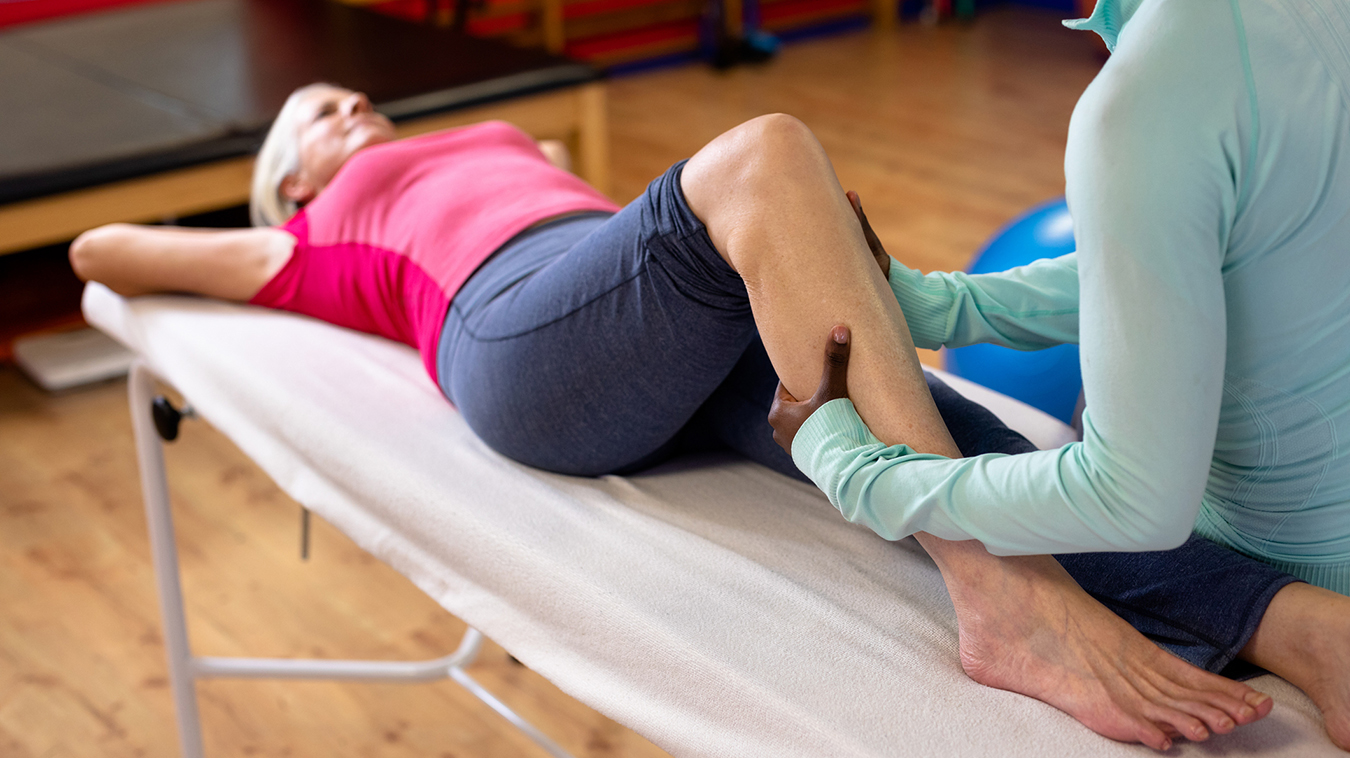At Mayfair Diagnostics we have a commitment to innovation and patient care, and offer a variety of treatments for joint pain and osteoarthritis. This includes nSTRIDE autologous protein solution (APS), which has been approved by Health Canada and the FDA for treatment of knee osteoarthritis (OA).
Nearly five million Canadians, or one in six, are affected by osteoarthritis – a disease of the whole joint that leads to the breakdown of joint cartilage and other tissues. It’s the most common form of arthritis and affects more Canadians than all other forms of arthritis combined.
WHAT IS OSTEOARTHRITIS?
In normal joints, cartilage – the tough elastic material that covers and protects the ends of bones – acts as a cushion and provides a smooth, gliding surface for joint motion. OA causes the cartilage to breakdown, leading to pain, swelling, and problems moving the joint. As it worsens over time, the cartilage wears away and other tissues, such as ligaments, tendons, and bone, also degenerate, contributing to symptoms such as reduced joint motion or instability and increased pain.
OA usually progresses slowly over months or years and early symptoms tend to come and go. As damage accumulates, symptoms can become more constant, occurring at rest and disturbing sleep. There is currently no cure for OA, but symptoms can improve with treatment, such as APS.
HOW DOES APS WORK?
The treatment involves a single injection of a protein liquid derived from your own blood. It’s drawn from an arm vein prior to the injection and centrifuged to remove unwanted blood components and then spun again to obtain the protein liquid. APS has proven to be a safe and effective treatment, which has been shown to reduce pain and protect cartilage by reducing further destruction. As a result, there is a decrease in pain and an improvement in joint function, often within a few weeks of the injection. In clinical studies, patients reported little or no pain in 85% of cases after the procedure and about 70% symptom improvement even 24 months after the treatment.
This treatment has been evaluated most extensively in the knee and is most effective in treatment of mild to moderate OA. As APS promotes healing by recruiting the body’s own repair system, the process can take a few weeks. Most patients begin to notice improvement after 1-2 weeks and should see continued improvement gradually over many months.
HOW DO I GET THIS PROCEDURE?
Osteoarthritis is a chronic (long-term) disease and, although there is no cure, research suggests earlier treatment and management may slow the disease. Earlier treatment will reduce your symptoms and make it possible for you to lead a full and active life. It’s important to thoroughly discuss all your options with your health care practitioner.
Pain management procedures must be requested by a health care practitioner. We usually request that you have had an X-ray at least six months prior to this procedure. Sometimes an ultrasound is also requested prior to this procedure to look for effusion, cysts, or bodies in the joint, and to assess the soft tissue envelope of the joint.
Once the cause has been identified and treatment options reviewed, an APS procedure may be recommended by us or requested by your practitioner. You will be given a requisition. Once we have received the requisition, we will review it and contact you to confirm the area and type of injection requested, and to book the appointment.
HOW MUCH DOES APS COST?
Please note that APS can’t be performed on patients with inflammatory arthritis (e.g., rheumatoid arthritis). You will also need to avoid anti-inflammatories (ibuprofen, etc.) for two weeks before and two weeks after your injection.
Usually, a single APS treatment is advised. There is a cost of $1,150, which may be covered by a health spending account or group medical insurance plan. You will need to check with your plan administrator for coverage details.
WHAT HAPPENS DURING MY PROCEDURE?
During this treatment, we will take a small volume of blood from your arm to prepare the injection. The blood sample is placed in a centrifuge and then prepared in a sterile manner. You can rest in a waiting room during this process, which takes 10-20 minutes.
When we are ready to begin, a technologist will bring you into the treatment room and position you on the table. A radiologist will evaluate the area, clean the skin, and inject a local anesthetic. Once frozen, using image guidance, the radiologist will inject the APS preparation into the affected joint using a sterile needle.
This process allows the solution to be injected into a localized and specific area of concern while keeping potential side effects to a minimum. You will be assessed post-injection by our team and, if there are no concerns, you will be free to leave.
After the treatment, you will be advised:
- First 24 hours: Keep the treatment area clean. Leave the Band-Aid on. Do not shower. Please rest the injected area for the rest of the day after your injection.
- First 48 hours: Avoid bathtubs, hot tubs, and pools. Avoid strenuous activity and lifting.
- After one week: Avoid strenuous activity or physiotherapy for at least five days following your injection with a gradual return to activity. Be mindful of your pain and stop if it hurts too much, or other symptoms worsen. You may resume physiotherapy, but notify your physiotherapist that you have had this injection so they can modify your exercises if necessary.
Studies suggest symptoms will be improved for up to 24 months or longer. The goal is to promote your body to decrease inflammation in the joints and protect cartilage from further thinning. If an injection does not help relieve your symptoms after three months, then you may need further evaluation.
DOES IT HURT?
A common side effect of the procedure is mild but temporary pain or aching of the joint that gradually subsides within 24-48 hours. There may also be mild bruising at the site of injection or blood draw. Over-the-counter pain medications (not anti-inflammatory) or using heat on the area can help.
Most patients find the pain tolerable. Mayfair’s expert team has extensive experience in performing these procedures and do our very best to make them as quick and painless as possible.
REFERENCES
Arthritis Foundation (2021) “Osteoarthritis.” www.arthritis.org. Accessed January 10, 2021.
Arthritis Society Canada (2021) “Osteoarthritis.” www.arthritis.ca. Accessed January 10, 2021.
Healthwise Staff (2021) “Osteoarthritis.” www.MyHealth.Alberta.ca. Accessed January 10, 2021.
Kon, E., et al. (2018) “Clinical Outcomes of Knee Osteoarthritis Treated With an Autologous Protein Solution Injection: A 1-Year Pilot Double-Blinded Randomized Controlled Trial.” American Journal of Sports Medicine. Jan; 46(1):171-180.



